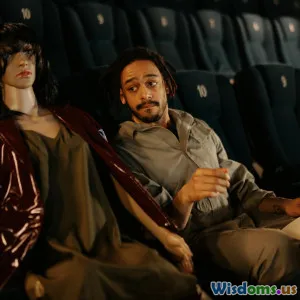
The Influence of Directors on Modern Cinema
7 min read Explore how visionary directors shape modern cinema with innovative storytelling, visual style, and cultural impact. (0 Reviews)
The Influence of Directors on Modern Cinema
Cinema has long been a collaborative medium, but at its helm stands a creative force that profoundly shapes the art form—the director. In modern cinema, the director’s role surpasses mere coordination; they are the storytellers, visionary architects, and cultural commentators that breathe life into scripts, transforming celluloid dreams into iconic and influential experiences. Understanding their influence helps us appreciate why films resonate deeply with audiences worldwide.
The Director as the Architect of Storytelling
A director’s primary influence lies in storytelling. While screenwriters lay the foundation with scripts, directors interpret and manipulate narrative elements to suit cinematic expression. Directors decide pacing, tone, and emotional beats, ensuring the story connects on levels beyond words.
For instance, Christopher Nolan's nonlinear narratives in films like Memento (2000) and Inception (2010) exhibit how a director's vision can reshape storytelling conventions. Nolan's complex plot structures challenge audiences to engage cognitively, pushing the boundaries of mainstream narratives.
Similarly, Greta Gerwig brought nuanced authenticity to the coming-of-age genre with Lady Bird (2017), capturing subtle family dynamics and adolescent aspirations with heartfelt realism. Her directorial choices highlight the impact of sensitivity and perspective on narrative depth.
Visual Style: Directors as Artists
Modern directors often establish the visual language of their films, influencing trends in cinematography, production design, and special effects. The iconic use of color, camera angles, and lighting choices becomes inseparable from the film’s identity.
Wes Anderson is a prime example; his meticulous symmetry and pastel palettes define his unique aesthetic, seen in The Grand Budapest Hotel (2014). Anderson’s stylistic precision creates distinctive moods and injects whimsy, affecting graphic design, advertising, and fashion beyond cinema.
In contrast, Alfonso Cuarón’s handheld camera work and extended takes, especially in Children of Men (2006) and Roma (2018), immerse viewers in an intimate and visceral experience. His innovative use of long continuous shots garners emotional intensity and realism, influencing many contemporary filmmakers.
Technological Visionaries and Pioneers
Directors today also drive technological advancements. James Cameron’s Avatar (2009) revolutionized 3D cinema and motion-capture technology, making immersive storytelling a blockbuster norm. His risk-taking has influenced a generation of filmmakers to push the envelope of visual effects and virtual reality integration.
Quentin Tarantino’s commitment to film stock and practical effects in the digital age reflects a desire to preserve and celebrate traditional filmmaking techniques while maintaining a fresh narrative impact. This juxtaposition showcases how directors also influence preservation and innovation dynamics.
Cultural Impact and Social Commentary
Directors influence not only the film’s artistic side but also its social and cultural ramifications. Jordan Peele stands out by merging horror with sharp societal critiques in Get Out (2017) and Us (2019), addressing race relations and systemic issues. His work shows how directors wield their platform to inspire dialogue and awareness.
Moreover, Ava DuVernay’s Selma (2014) highlights the power of directing in historical recounting and representation, bringing civil rights struggles to the forefront and influencing conversations on justice and equality.
The Economic Power of a Director's Name
Beyond artistry, directors influence a film’s marketability. Studios often greenlight high-budget films based on the attachment of a big-name director. Steven Spielberg, for example, remains a box office magnet, his involvement signaling quality and commercial viability, seen in franchises like Jurassic Park.
This economic influence also extends to streaming platforms, which invest heavily in auteur-driven projects to differentiate content in a saturated market. The director’s vision thus has direct financial implications.
Conclusion: Why Directors Matter in Today’s Cinema
The director’s influence on modern cinema is multifaceted—melding storytelling innovation, unique visual style, pioneering techniques, cultural commentary, and commercial sway. Their vision shapes not just a single film but often entire genres, trends, and audience expectations.
By understanding a director’s role and impact, viewers gain deeper appreciation of the artistry and effort behind favorite films. Aspiring filmmakers, critics, and enthusiasts alike can find inspiration in studying how these creative leaders shape cinema’s evolving landscape.
Modern cinema’s vitality owes much to visionary directors who dare to innovate, challenge, and inspire, ensuring that moving pictures remain moving experiences in every sense.
References:
- Nolan, C. (Director). (2010). Inception [Film]. Warner Bros.
- Gerwig, G. (Director). (2017). Lady Bird [Film]. A24.
- Anderson, W. (Director). (2014). The Grand Budapest Hotel [Film]. Fox Searchlight.
- Cuarón, A. (Director). (2018). Roma [Film]. Netflix.
- Cameron, J. (Director). (2009). Avatar [Film]. 20th Century Fox.
- Peele, J. (Director). (2017). Get Out [Film]. Blumhouse.
- DuVernay, A. (Director). (2014). Selma [Film]. Paramount Pictures.
- Spielberg, S. (Director). (1993). Jurassic Park [Film]. Universal Pictures.
Rate the Post
User Reviews
Popular Posts


















